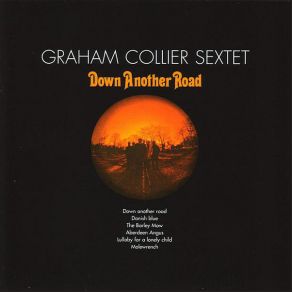Down Another Road
Download links and information about Down Another Road by Graham Collier. This album was released in 2000 and it belongs to Jazz genres. It contains 6 tracks with total duration of 49:10 minutes.

|
|
|---|---|
| Artist: | Graham Collier |
| Release date: | 2000 |
| Genre: | Jazz |
| Tracks: | 6 |
| Duration: | 49:10 |
| Buy it NOW at: | |
| Buy on iTunes $9.99 | |
Tracks
[Edit]| No. | Title | Length |
|---|---|---|
| 1. | Down Another Road (featuring Graham Collier Music, John Marshall, Harry Beckett, Stan Sulzmann) | 5:16 |
| 2. | Danish Blue (featuring Graham Collier Music, John Marshall, Harry Beckett, Stan Sulzmann) | 17:39 |
| 3. | The Barley Mow (featuring Karl Jenkins, Graham Collier Music, John Marshall, Harry Beckett) | 5:34 |
| 4. | Aberdeen Angus (featuring Graham Collier Music, John Marshall, Harry Beckett, Stan Sulzmann) | 6:07 |
| 5. | Lullaby for a Lonely Child (featuring Graham Collier Music, Harry Beckett, Stan Sulzmann) | 5:40 |
| 6. | Molewrench (featuring Karl Jenkins, Graham Collier Music) | 8:54 |
Details
[Edit]The irony of Graham Collier's output being reissued on CD through a small Spanish label is mitigated by the knowledge that at the time of this reissue, the bassist/ composer was living in Spain. This is one of several splendid recordings of Collier reissued by the label and this one maintains the high level of quality achieved by the others. While Collier performs on bass it is his extraordinary compositional and organizational skills for which this recording will be remembered. The rather ordinary instrumentation of sax, trumpet, and trombone backed by a rhythm section might have seemed utterly conservative in the late '60s, but Collier infuses the medium with a stately flair that lays the groundwork for some outstanding soloing by Harry Beckett on flugelhorn, Nick Evans on trombone, and Stan Sulzmann on saxes, all three of whom would to lead successful careers. Pianist Karl Jenkins makes a surprisingly good showing on oboe, and his interaction with Beckett on the lengthy "Danish Blue" features his sharply focused tone. At heart, Collier is an instigator: He sets up the framework for his improvisers. Sometimes he incorporates rock riffs but mostly he stays squarely within the boundaries of modern jazz writing. His arranging skills have been compared favorably and fairly to those of Gil Evans and Charles Mingus, and the influences are there, but Collier is an original writer. His works are generally tonally centered and contain melody, but he encourages collective improvisation and stretched harmonies. His pieces carefully balance emotional depth and intellectual rigor, with wonderful harmonies and consistently high levels of performance. This one hits the mark with its carefully constructed compositions and magnificent improvisations.